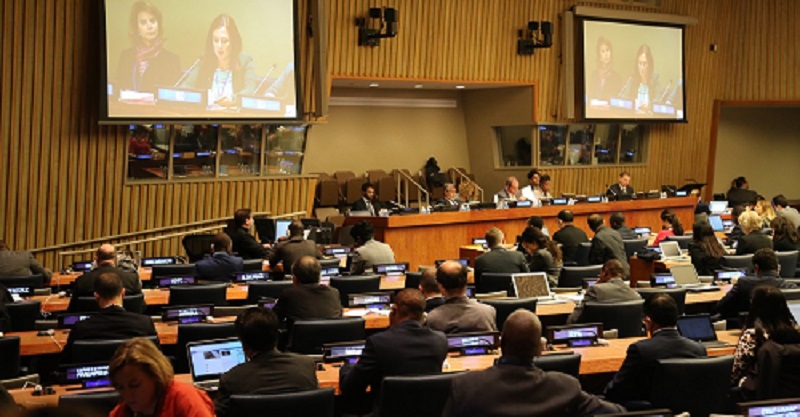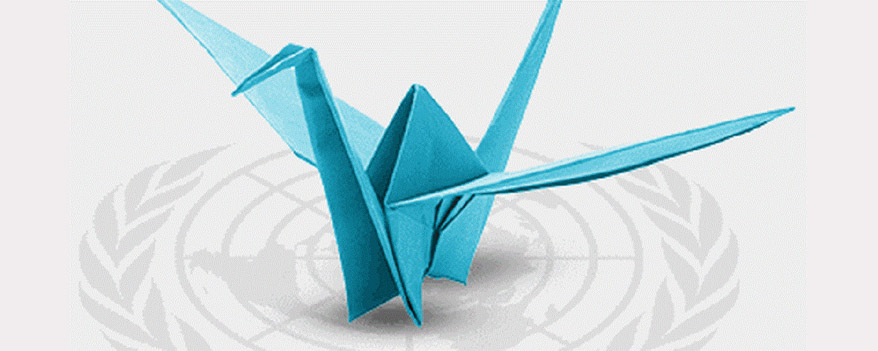Oct 24-30 was UN Disarmament Week, during which member states voted on a range of disarmament decisions and resolutions.
Decisions generally relate to actions to be undertaken by UN Secretariat, and require implementation. Resolutions, on the other hand, are mostly indications of governments’ positions and intent. They can be very authoritative and influential if supported by key countries, but are generally not binding on the UN member States, unless they are framed in mandatory terms and adopted by consensus or near consensus (a primary function is codification of existing international law).
The deliberations and votes took place in an environment of increasing tensions between nuclear armed States, and also an increasing divide between non-nuclear countries and those countries which rely on nuclear weapons for their security.
Nuclear risk-reduction:
- A resolution Reducing nuclear danger submitted by India received 127 votes in favour (mostly non-aligned countries). It failed to get support of nuclear-armed or European countries, primarily because it only calls for nuclear risk reduction measures by China, France, Russia, UK and USA – leaving out the other nuclear armed States – India, Pakistan, DPRK and Israel.
- A resolution Decreasing the operational readiness of nuclear weapons systems submitted by a group of non-nuclear countries, was much more successful receiving 173 votes in favour, including from most of the NATO countries and from four nuclear armed States (China, DPRK, India, Pakistan).

Nuclear prohibition:
- A resolution on the Treaty on the Prohibition Nuclear Weapons (TPNW) was supported by 122 countries. This is more than the number who have signed the Treaty, which is 68 (with 19 of these countries having now ratified). The vote indicates that more signatures are likely. However, the resolution was not supported by any of the nuclear-armed countries, nor any of the countries under nuclear deterrence relationships, i.e. NATO, Australia, Japan, South Korea. The opposition of nuclear-armed and allied States to the resolution is another indication that they do not intend to join the new treaty. In general, this means that they will not be bound by the treaty’s obligations. However, the customary law against the use of nuclear weapons which is re-affirmed by the treaty will apply to all States regardless of whether or not they join.
- A resolution on the prohibition of the use of nuclear weapons submitted by India received 120 votes in favour, including from themselves and another three nuclear-armed States (China, DPRK and Pakistan). Some non-nuclear States have historically opposed the resolution in response to India testing nuclear weapons and becoming a nuclear-armed State in 1998. India has requested these countries to reconsider their opposition, especially in light of the international conferences on the humanitarian impact of nuclear weapons in which India participated and which highlighted the importance of preventing any use of nuclear weapons.
UN Conferences:
- A resolution affirming a previous decision to hold a UN High-Level Conference (Summit) on Nuclear Disarmament was supported by 143 countries. The resolution, entitled Follow-up to the 2013 high-level meeting of the General Assembly on nuclear disarmament, also promotes negotiations on a Nuclear Weapons Convention – a treaty to prohibit nuclear weapons that includes nuclear-armed States (unlike the TPNW which does not include them). Despite getting a strong vote in favour, including from some nuclear armed states, the proposed conference does not yet appear to have enough political traction to be held. The resolution did not set a date for the conference.
- The UNGA adopted a Decision to convene a conference no later than 2019 on the establishment of a Middle East zone free of nuclear weapons and other weapons of mass destruction. Despite the objective of a Middle East Zone being supported by most UN members in a separate resolution (supported by 174 countries), the decision to convene a conference in 2019 to ‘elaborate a legally binding treaty’ was supported by only 103 countries. The hesitation by many countries to support the resolution was due to the fact that they believed that concrete preparations and negotiations for a Middle East Zone Treaty would require the participation of all countries in the region, and currently there is at least one country (Israel) that is not ready to work on such a regional treaty.
Humanitarian consequences and the law
- A resolution on the Humanitarian consequences of nuclear weapons, was supported by 143 countries, including one nuclear armed State (India) and one of the nuclear allied States (Japan). Most other nuclear-armed and allied States abstained or opposed because the resolution states that ‘awareness of the catastrophic consequences of nuclear weapons must underpin all approaches and efforts towards nuclear disarmament.’ The nuclear armed and allied States accept that humanitarian impact shoud be considered, but they argue that security reasons for nuclear deterrence must also be addressed in order to relinquish nuclear weapons and achieve a nuclear-weapon-free world.
- A resolution on the legal requirement to achieve nuclear disarmament through multilateral nuclear disarmament negotiations was supported by 131 countries. In previous years the resolution, which draws upon the 1996 International Court of Justice (ICJ) Advisory Opinion, found greater support (137 countries in favour), including from some of the nuclear armed States. Previously, the primary call of the resolution had been for negotiations leading to a nuclear weapons convention which would include the nuclear armed and allied States. However, the resolution has been amended to call instead for nuclear disarmament through the Treaty on the Prohibition of Nuclear Weapons, which none of the nuclear-armed or allied countries support. This has led to a drop in support for the resolution. See for example, the Explanation of Vote by India on the ICJ follow-up resolution.
Other discussions and resolutions
There were other disarmament discussions at the UN General Assembly last week – included a heated discussion between Russia and the United States over the Intermediate Nuclear Forces Treaty (INF). Both US and Russia claim that the other party is in violation of the treaty, and last week President Trump announced that the US was initiating procedures to withdraw from the treaty.
In addition there were a number of other disarmament resolutions that were introduced, some of which were adopted and some of which are being actioned (voted upon) this week.
For more information see
- UNGA First Committee
- Press releases: Nov 1 and Nov 2.
- Reaching Critical Will UN First Committee

